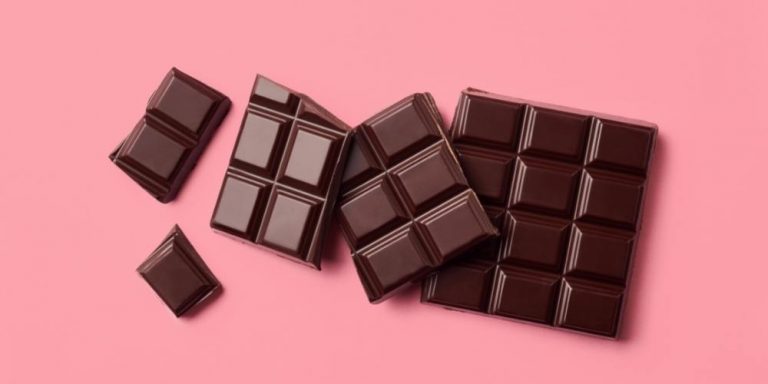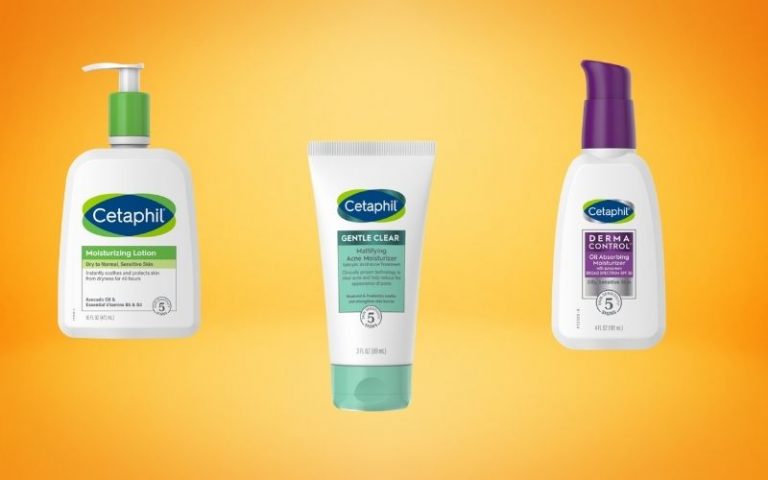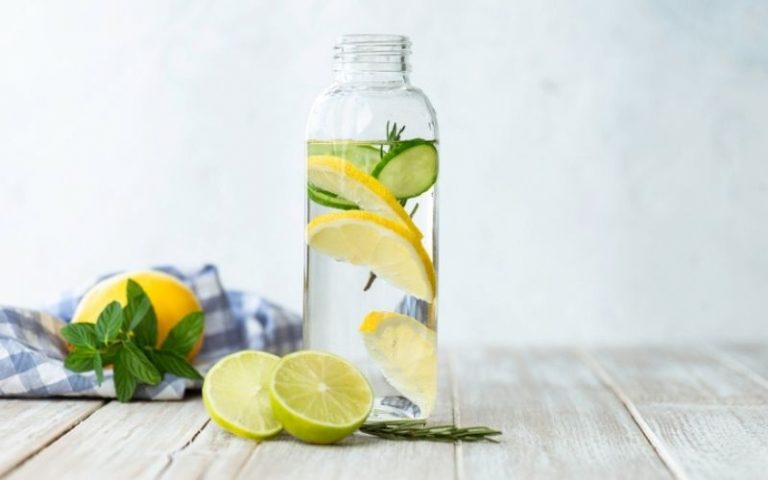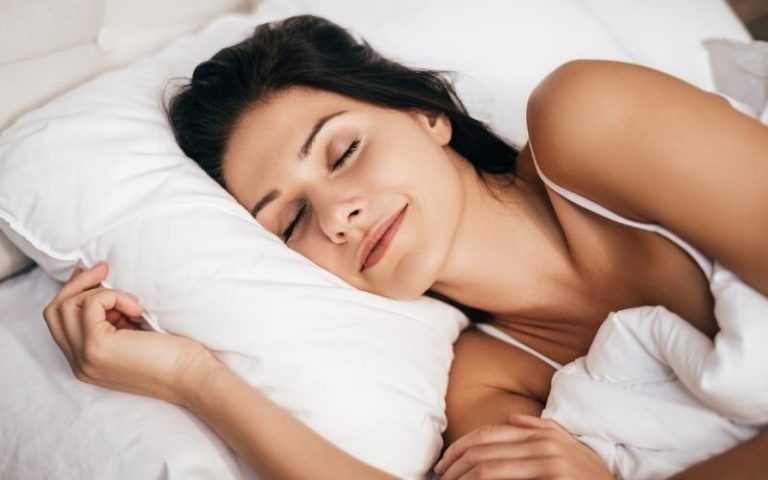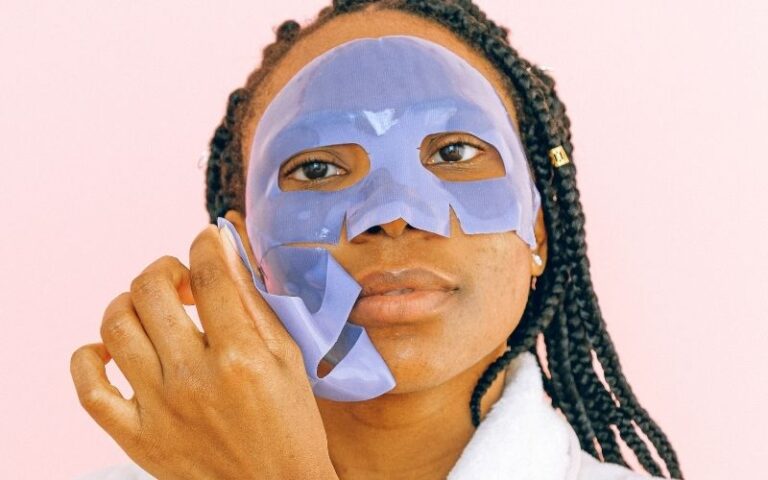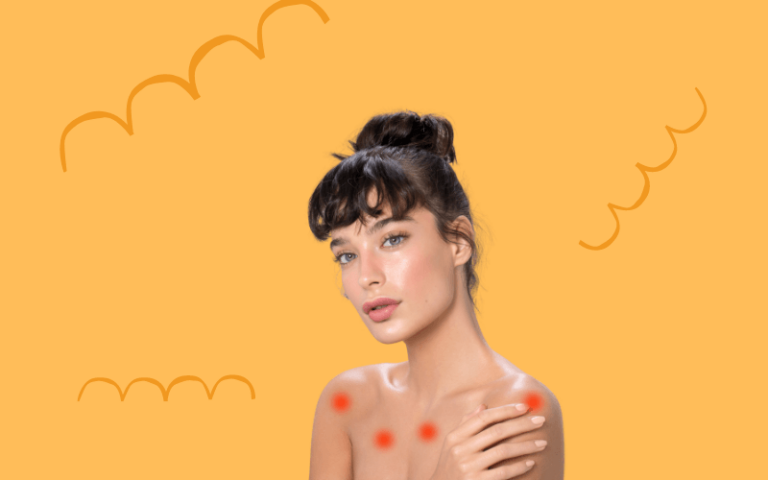The Exact Amount Of Water To Drink To Banish Acne For Good
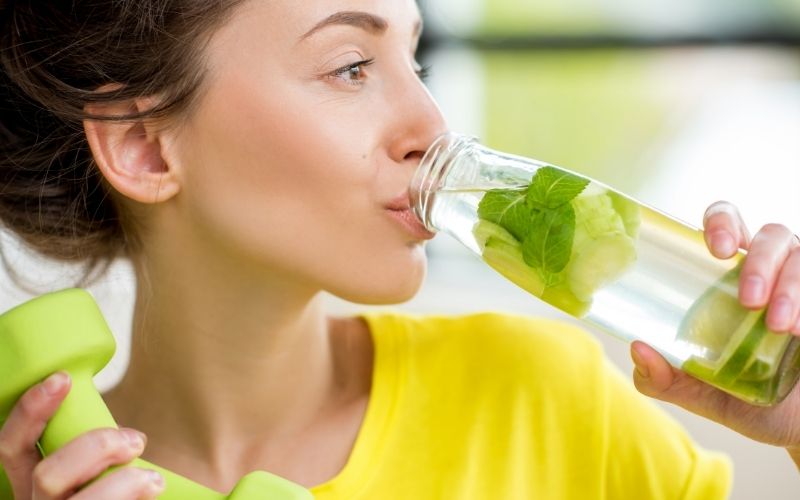
Does drinking water help acne? Water is essential for life.
It provides hydration and allows the body to carry out its functions. But, will drinking more water help your acne clear up?
Acne is caused by c. acnes, or cutibacterium acnes, which is a type of bacteria that lives in pores, hair follicles, and sebaceous glands.
Our bodies are about 70% water, so it makes sense that the amount of water we consume will impact our health.
If we don’t drink enough water, we can become dehydrated, develop acne, dry skin, reduced skin elasticity, wrinkles, fatigue, fine lines, and more.
We lose water every day through sweat, urine, and even our breath. It’s important to replace those losses by drinking water daily.
Go grab a glass of water and read on!
Benefits of drinking water
Water comes in many forms, but we will focus on the clear, fluid water that often comes to mind when we think “water.”
Technically there is some water content in coffee, juice, soda, milk, and even some foods like fruit and soup.
But some of those beverages (especially soda) also contain added sugars (a no-no if we want to have clear skin).
The benefits of water for the body are endless.
Water provides your body with hydration, flushes out toxins, supports metabolism function, may help regulate blood sugar levels, and is good for overall health.
But, does drinking water help acne?
Well… kinda. Water may help prevent the development of acne.
Research has found some dietary components to be linked to skin acne.
For example, when you gobble high glycemic (sugary) foods, lots of dairy, and chocolate, you may worsen your acne.
Meanwhile, eating plenty of good omega-3 fats and some other nutrients may promote skin health (2).
Where does water fit into this conversation?
It’s not yet proven that drinking a lot of water will totally clear up your skin.
But the benefits of water are so plentiful that it’s recommended to drink enough water as a foundational health practice that promotes healthy skin and overall health.
When you drink water, it flows through the gastrointestinal system and most of it is absorbed in the small intestine.
It then travels around the body (in blood) and provides moisture to cells, including skin cells.
As water hydrates skin cells it promotes healthy skin which could reduce skin acne.
Eventually water is filtered by the kidneys and is excreted as pee.
Drinking enough water keeps your skin hydrated
Skin is actually the largest organ in the body.
It is made up of millions to trillions of tiny skin cells.
These cells, just like the rest of our body’s cells, need water to function.
When we drink water, the water goes on to hydrate our cells. By consuming sufficient water, we hydrate our skin.
This increases its water content. Without enough water, our skin can get dehydrated.
Dehydration can promote dryness, fine lines, wrinkles, and the skin’s elasticity may diminish. It may also promote acne, puffiness, rosacea, and other skin issues.
Study on water intake effect on skin
In a study published in Clinical, Cosmetic, and Investigational Dermatology, scientists looked at the water intake of about 50 participants (3).
They measured all sources of water in their diets, from both fluid intake and the small amount of water in food (foods like soup, fruit, and juice).
Then, one group was asked to add 2 liters of water each day for 4 weeks. The control group did not make any changes to their water intake.
The scientists found that that the people that drank the extra 2L of water had greater skin hydration and skin elasticity. Yay!
Hydrated skin is associated with younger, healthier looking skin tone – which may translate to less zits.
And who doesn’t want a more youthful appearance?
Water intake can regulate blood sugar levels
High levels of blood sugar and insulin spikes can cause acne to occur.
What happens is that when you gobble carbohydrates, especially simple sugars, increases the sugar in our blood which leads to insulin hormone going up to combat the high blood sugar.
Insulin spikes send signals to other hormones like insulin-like growth factor-1 (IGF-1) and this can start a chemical cascade that results in sebum production.
Uh oh!
Sebum plays a central role in acne develoment. It is a waxy, oily substance that combines with dead skin cells to clog pores and ultimately cause the development of acne.
Since water has no carbohydrates, it does not increase blood sugar levels.
Water provides blood sugar control
In fact, water can provide some blood sugar control by helping the body flush out excess blood sugar through urination (4).
So if you down a glass of water instead of soda or another sugary beverage, you are preventing an insulin spike that might have occured. That is a good thing.
By drinking plenty of water, along with watching our sugar intake, we can help prevent skin acne breakouts.
Maybe you’ll keep a bottle of water in your bag or backpack, now? Bonus points if you use a reusable bottle.
Drinking water flushes out toxins
The body has a complex way that it removes toxins.
Essentially the liver breaks down toxic substances, the kidneys further filter them out, and you excrete the toxins through urine and stool which is the body’s ability to get them out of your body.
Water is a large component of pee. By drinking sufficient water, the body can flush out more toxins. If we have less toxins that can lead to less breakouts.
Drinking water can support immune function
The outermost layer of our skin, called the epidermis, provides a barrier between us and the outside environment (5).
It blocks some pathogens (germs) from getting in.
Water supports this process.
Our skin cells need water in order to function as a barrier.
If germs do get into our bodies, water is crucial for our immune system to fight them off. For example, immune system cells need water in order to travel through the body to get to the site of infection.
And then having enough water allow us to flush out the germs or toxins. By eliminating the toxins, we reduce inflammation.
This can lead to lower inflammation and less skin acne.
More research is needed in this area but you definitely want to consume enough water.
Water is good for our overall health
Water is so essential and should be in your diet every day.
It can affect your mood, energy levels, and overall health. It plays a central role skin health and maybe even reduced pimples.
As we said, water is necessary for the function of all of your cells.
It’s no wonder that when you don’t drink enough water, you feel tired, irritable, and maybe get a headache.
In fact, studies have shown that not drinking enough water caused decreased contendedness, calmness, positive emotions and vigor.
Meanwhile, increasing water intake resulted in less sleepiness and improved mood (6).
How to increase water intake
If you currently don’t drink much water, maybe you start by adding a few bottles per day.
Yes, even if you’re not a big water drinker.
Then you can work it up to even more. Not drinking enough water can lead to dehydration which has negative consequences.
Some people complain that they don’t like the taste of water. Let’s face it, drinking plain water can be boring.
To spice things up, consider adding a slice of orange, lemon, or lime to your water. Short on time?
Spritz some lemon juice into your water.
And if you’re not a fan of lemon juice, you could even add strawberries, cucumber, or whatever else strikes your fancy.
If you go for a flavor powder, opt for a sugar-free one to prevent an insulin spike and sebum production.
How to tell if you’re drinking enough water?
First, always discuss this with a doctor.
A quick home tip is to look at the color of your pee. If it’s light yellow or close to clear, that indicates good water intake.
If it’s a more concentrated color like amber or darker, that may indicate dehydration or another medical condition (7).
We recommend discussing this with your doctor.
Does water clear acne: verdict
So does drinking water help with acne?
While researchers still haven’t found a direct link, sufficient water does support healthy skin function and overall health which in turn can reduce acne.
If you suffer from severe acne, then skin care products or a dermatologist can help. So can eating healthy foods, which includes water.
There’s no single recommendation for how much water to drink each day.
It’s dependent on your age, activity level, gender, and health.
For best results, drink water every day according to your personal needs.
Cheers! (with a glass of water, of course)
1. Popkin, Barry M et al. “Water, hydration, and health.” Nutrition reviews vol. 68,8 (2010): 439-58. doi:10.1111/j.1753-4887.2010.00304.x
2. Baldwin, Hilary, and Jerry Tan. “Effects of Diet on Acne and Its Response to Treatment.” American journal of clinical dermatology vol. 22,1 (2021): 55-65. doi:10.1007/s40257-020-00542
3. Palma, Lídia et al. “Dietary water affects human skin hydration and biomechanics.” Clinical, cosmetic and investigational dermatology vol. 8 413-21. 3 Aug. 2015, doi:10.2147/CCID.S86822
4. “Water and diabetes.” Diabetes.co.uk, Mar. 2019, www.diabetes.co.uk/food/water-and-diabetes.html.
5. Mojumdar, Enamul Haque et al. “Skin hydration: interplay between molecular dynamics, structure and water uptake in the stratum corneum.” Scientific reports vol. 7,1 15712. 16 Nov. 2017, doi:10.1038/s41598-017-15921-5
6. Pross, Nathalie et al. “Effects of changes in water intake on mood of high and low drinkers.” PloS one vol. 9,4 e94754. 11 Apr. 2014, doi:10.1371/journal.pone.0094754
7. “What the color of your pee says about you.” Cleveland Clinic, Sept. 2020, https://health.clevelandclinic.org/what-the-color-of-your-urine-says-about-you-infographic/
